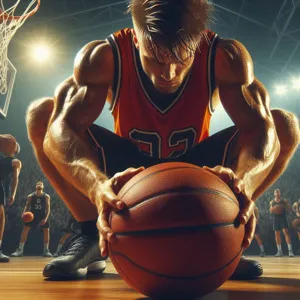Every basketball player, regardless of skill level, has experienced the disappointment of a bad game—those moments when the shots just won’t fall, the defense feels lackluster, and frustration simmers on the court.
Yet, it’s not the setback that defines a player, but how they choose to respond to it. In “Bouncing Back: Effective Strategies to Overcome a Bad Basketball Game,” we delve into the mindset and tactics that can turn a rough night into a valuable learning experience. From mental resilience and self-reflection to practical drills and team communication, this guide offers essential strategies that will help players not only recover but flourish after a tough outing. Join us as we explore how to shake off the disappointment, regain your confidence, and come back stronger than ever on the court.
1. Acknowledging Your Feelings: Processing the Disappointment

After a tough basketball game, it’s perfectly natural to feel a whirlwind of emotions—disappointment, frustration, or even self-doubt. Acknowledging these feelings is the first step toward recovery and growth. Instead of bottling up emotions or dismissing them as unimportant, give yourself permission to feel. Take a moment to sit quietly, reflect on the game, and let the disappointment wash over you.
Recognize that it’s okay to be upset about a performance that didn’t meet your expectations. Whether it was a missed shot at a critical moment, a defensive lapse that led to easy points for the opponent, or simply a game where everything seemed to go wrong, allowing yourself to process these feelings is crucial. Journaling can be a therapeutic way to express your thoughts, helping you articulate what went well and what didn’t.
Moreover, talking about your feelings with teammates, coaches, or friends can provide valuable perspectives. Sharing your experiences helps to validate your emotions and reminds you that you’re not alone in feeling this way. Many athletes have faced the same challenges and have come out stronger on the other side. Embrace this moment as part of your journey; every setback is an opportunity for growth and learning. When you allow yourself to fully process your disappointment, you’ll find it easier to move forward with renewed focus and determination.
2. Analyzing the Game: What Went Wrong?
Analyzing the game is a crucial step in bouncing back from a disappointing performance on the basketball court. After the final buzzer has sounded and the initial emotions have settled, it’s time to dive deep into the details of what transpired during the game. This phase of reflection can be uncomfortable, but it’s essential for growth and improvement.
Start by reviewing the game footage, if available. Watching the game again allows you to observe plays you may have missed in the heat of the moment. Pay close attention to your positioning, shot selection, and defensive assignments. Were you rushing your shots, or were you too passive on offense? Did you struggle to communicate with your teammates, leading to missed rotations on defense? These insights can often reveal patterns that need addressing.
Next, consider your stats. Look beyond just points scored; examine rebounds, assists, turnovers, and fouls. These numbers tell a story about your performance and can highlight specific areas for improvement. For example, a high turnover rate might indicate a need for better ball-handling skills or decision-making under pressure.
Don’t forget to engage with your teammates and coaches. Discussing the game with others can provide valuable perspectives that you might overlook on your own. They may have noticed things happening on the court that you were unaware of, or they might have insights into the opposing team’s strategies that could inform your future play.
Finally, be honest with yourself. Acknowledging your shortcomings is not a sign of weakness, but rather a step towards becoming a better player. Whether it’s your conditioning, focus, or understanding of the game, embracing these challenges is the first step to making the necessary adjustments for the next game. By taking a comprehensive approach to analyzing what went wrong, you can turn a tough loss into a powerful learning experience that sets the stage for future success.
3. Seeking Feedback: Learning from Coaching and Teammates

After a tough game, one of the most valuable steps you can take is to seek feedback from your coach and teammates. This process not only fosters a culture of growth and improvement but also reinforces the idea that basketball is a team sport where collective insights can lead to individual development.
Start by scheduling a time to sit down with your coach. Engage in an open dialogue about your performance—discuss what went wrong, but also what went right. Coaches often have a broader perspective on the game and can identify patterns in your play that you might have overlooked. They can provide constructive criticism as well as positive reinforcement, helping you to see that every game is an opportunity to learn. Ask specific questions about your decision-making during pivotal moments, your positioning on defense, or how you can enhance your offensive play. This targeted feedback can illuminate areas for improvement that may not be immediately apparent.
Equally important is gathering input from your teammates. They are your allies on the court and can offer insights based on their observations. Consider conducting a casual discussion in the locker room or on the way home from the game. This collaborative approach can foster camaraderie, as everyone has likely experienced similar struggles at some point. Sharing perspectives allows you to learn from each other’s experiences, whether it’s about managing pressure, maintaining focus, or executing plays under stress.
Moreover, don’t shy away from discussing specific plays or moments that stood out during the game. This kind of reflection not only helps you understand what to improve but also strengthens your communication with your teammates, which is essential for future success on the court. Remember, every player has their off days; what sets the great ones apart is their ability to analyze, adapt, and ultimately bounce back stronger than before. Embrace this feedback and use it as a powerful tool in your journey to becoming a better player.
4. Reflecting on Your Performance: Self-Assessment Techniques
After a tough game, reflecting on your performance through self-assessment techniques can be incredibly beneficial. This process not only helps you identify areas for improvement but also fosters a mindset of growth and resilience. Begin by reviewing the game footage, if available. Watching yourself play can provide valuable insights into your decision-making, positioning, and overall gameplay. Pay attention to both the highlights and the mistakes; acknowledging your successes alongside your shortcomings creates a balanced perspective.
Next, consider keeping a performance journal. Write down your thoughts immediately after the game—what you felt worked well and what didn’t. This tangible record will help you track your progress over time and identify recurring patterns in your performance. Be honest with yourself. If you struggled with your shooting or missed defensive assignments, detail those instances and reflect on the possible reasons behind them.
Additionally, seek feedback from your coaches and teammates. Their perspectives can highlight blind spots in your self-analysis. They may notice aspects of your game you hadn’t considered, or offer strategies that worked for them in similar situations.
Finally, set specific, measurable goals for your next practice or game based on your reflections. Whether it’s improving your shooting percentage, enhancing your defensive skills, or increasing your on-court communication, having clear objectives will give you direction and focus. Remember, every setback can be a setup for a comeback; by reflecting on your performance, you equip yourself with the tools needed to bounce back stronger than ever.
5. Setting Realistic Goals for Improvement

After a challenging game, it’s easy for emotions to take over, leading to feelings of frustration or even defeat. However, one of the most effective strategies for bouncing back is to set realistic goals for improvement. This approach not only fosters a positive mindset but also provides a clear path forward.
Start by reflecting on the specific areas where performance fell short. Was it a lack of defensive intensity, poor shooting accuracy, or perhaps miscommunication with teammates? Identify these key aspects and set achievable targets. For example, instead of aiming to score 30 points in the next game, focus on improving your shooting percentage by 10% or enhancing your free throw success. This shift in focus helps to break down the larger picture into manageable chunks that can be tackled one step at a time.
Consider implementing short-term goals that can be measured within the span of practices leading up to your next game. This might include committing to extra shooting drills, participating in team-building exercises, or dedicating time to study game footage for strategic insights. Celebrate small victories along the way; each improvement, no matter how minor it may seem, contributes to overall growth.
Additionally, communicate your goals with your coach and teammates. This not only fosters accountability but also encourages a supportive environment where everyone is working towards collective improvement. Share your aspirations openly, and be willing to listen to the insights and goals of others. This collaborative atmosphere can lead to enhanced team dynamics and camaraderie, ultimately elevating everyone’s performance.
Setting realistic goals for improvement is a powerful tool in overcoming the setbacks of a bad game. By focusing on specific, achievable objectives, you’ll not only enhance your skills but also rebuild your confidence, ensuring that you bounce back stronger and more prepared for the challenges that lie ahead. Remember, every great player has faced adversity; it’s how you respond that defines your journey.
6. Developing a Post-Game Routine: Recovery and Reflection
After a tough game, it’s essential to establish a post-game routine that encompasses both recovery and reflection. This dual approach not only helps your body bounce back but also nurtures your mental resilience, ensuring you’re ready to tackle the next challenge head-on.
**Recovery** begins the moment you step off the court. Hydration is key; replenish the fluids lost during the game to aid in muscle recovery and prevent fatigue. Incorporate a balanced snack or meal rich in protein and carbohydrates to help repair muscles and restore energy levels. Stretching is another vital component—gentle post-game stretches can alleviate tension, improve flexibility, and minimize the likelihood of injury in future games. Consider adding foam rolling into your routine to target tight areas and enhance blood flow.
Equally important is the **reflection** aspect of your post-game routine. Carving out time to sit down and analyze your performance can provide invaluable insights. Whether you choose to jot down notes in a journal or engage in a discussion with your coach or teammates, reflecting on what went well and what needs improvement can help you identify specific areas to focus on in practice. Think about not just the statistics of the game, but also your mental approach, decision-making, and teamwork. Recognizing your emotional response to the game can also be beneficial; understanding how you cope with disappointment is crucial for long-term growth.
Combining these elements into a cohesive post-game routine not only aids in physical recovery but also fosters a mindset geared towards continuous improvement. Embrace the opportunity to learn from each experience, and you’ll find that every setback becomes a stepping stone on your journey to success in basketball and beyond.
7. Staying Positive: The Power of a Growth Mindset

In the realm of sports, particularly basketball, the mental game can often be just as crucial as physical prowess. After a disappointing performance, it’s easy to be swept away by negative thoughts and self-doubt. However, cultivating a growth mindset can be a game-changer, transforming setbacks into opportunities for growth and improvement.
A growth mindset, a concept popularized by psychologist Carol Dweck, is the belief that abilities and intelligence can be developed through dedication and hard work. This perspective encourages players to view mistakes not as failures but as valuable learning experiences. Rather than fixating on what went wrong in a bad game, players can analyze their performance, identifying specific areas for improvement. Perhaps it was a missed free throw, a lack of defensive effort, or poor communication with teammates; whatever it may be, acknowledging these aspects is the first step toward growth.
Staying positive also involves surrounding yourself with supportive teammates and coaches who encourage constructive feedback rather than criticism. Engaging in open discussions about the game can foster a collaborative environment where everyone feels empowered to grow. Additionally, visualization techniques can be a powerful tool. Picture yourself succeeding in various game scenarios—making that crucial shot, executing a perfect play, or leading the team with confidence. Visualizing success can help rewire your brain for positive outcomes and bolster your self-belief.
Moreover, maintaining a routine that includes physical conditioning, practice, and mental exercises can reinforce a growth mindset. Celebrate small victories, whether it’s improving your shooting technique or enhancing your defensive skills during practice. These achievements can serve as reminders that progress is being made, even if it’s not immediately reflected in game performance.
Ultimately, by embracing a growth mindset, you can shift your focus from the disappointments of a single game to the opportunities for improvement and success in the future. Remember, every great player has faced challenges and setbacks; it’s how you respond to them that defines your journey. So, after a tough game, take a deep breath, reflect positively, and gear up to bounce back stronger than ever.
8. Physical Recovery: Importance of Rest and Nutrition
After a tough game, it’s easy to feel defeated, but physical recovery is crucial for bouncing back and preparing for your next challenge on the court. Your body has undergone intense strain, and addressing that through proper rest and nutrition can make all the difference in your recovery process.
First and foremost, prioritize rest. Allowing your body to recuperate is essential for muscle repair and overall recovery. This doesn’t just mean getting a good night’s sleep after a game; it may also involve taking a day or two off from rigorous training to let your body heal. Listen to your body—if you feel fatigued or sore, it’s a clear signal that your muscles need time to recover. Incorporating light activities like stretching or yoga can promote blood flow and flexibility without overexerting yourself.
Nutrition plays an equally vital role in recovery. The food you consume post-game is your body’s fuel for repair and rejuvenation. Focus on replenishing lost nutrients with a balanced diet rich in protein, healthy fats, and carbohydrates. Protein is essential for muscle repair, while carbohydrates restore glycogen levels depleted during the game. Consider incorporating foods like lean meats, legumes, whole grains, and plenty of fruits and vegetables into your meals. Hydration is also critical; water helps flush out toxins and supports every cellular function in your body. Don’t overlook sports drinks or electrolyte-infused beverages to help replenish what was lost during intense play.
Incorporating these recovery strategies not only aids in healing but also sets the foundation for improved performance in your next game. By prioritizing rest and nutrition, you’ll find yourself feeling stronger, more energized, and ready to tackle whatever challenges come your way on the court. Remember, a single bad game doesn’t define your season—how you recover can set the stage for your next triumph.
9. Mental Resilience: Techniques to Boost Confidence
In the high-stakes world of basketball, mental resilience can often make the difference between a fleeting setback and a triumphant comeback. After a tough game where the shots just wouldn’t fall, it’s vital to rebuild your confidence and fortify your mental game. Here are some effective techniques to help you bounce back and restore your belief in your abilities.
**Positive Self-Talk:** One of the simplest yet most powerful tools at your disposal is the art of positive self-talk. Replace negative thoughts—those pesky “I can’t do this” or “I’m not good enough” mantras—with affirmations that empower you. Phrases like “I’m a skilled player” and “I have the ability to improve” can reshape your mindset. Repeat these affirmations during practice, before games, and even in front of the mirror to reinforce your self-belief.
**Visualization Techniques:** The mind is a powerful ally. Spend a few minutes each day visualizing yourself succeeding on the court. Imagine making that perfect shot, executing flawless passes, and celebrating victory with your teammates. This mental rehearsal not only boosts your confidence but also helps you prepare for future games by creating a mental blueprint for success.
**Focus on the Process:** Instead of fixating on the outcome of the last game, shift your focus to the process. Concentrate on the fundamentals—your shooting form, defensive stance, and teamwork. By honing in on these specific aspects, you’ll regain a sense of control and purpose, ultimately translating this focus into improved performance.
**Mindfulness and Breathing Exercises:** Incorporating mindfulness practices into your routine can significantly enhance your mental resilience. Techniques such as deep breathing, meditation, or even yoga can help you manage stress and anxiety. When you find yourself feeling overwhelmed after a poor performance, take a moment to breathe deeply, center your thoughts, and ground yourself in the present moment.
**Learn from Mistakes:** Every great athlete experiences setbacks. Instead of viewing a bad game as a failure, treat it as a valuable learning opportunity. Analyze what went wrong, identify areas for improvement, and create an action plan for your next practice. This proactive approach fosters growth and reinforces the idea that every challenge is a stepping stone toward becoming a better player.
By implementing these mental resilience techniques, you’ll not only boost your confidence but also cultivate a stronger, more resilient mindset. Remember, the true measure of a player is not how they handle victory, but how they respond to adversity. Embrace the challenge, learn from it, and watch yourself bounce back stronger than ever.
10. Practicing Visualization: Preparing for Future Games
Visualization is a powerful mental tool that can significantly enhance your performance on the basketball court. It involves mentally rehearsing your moves, plays, and even the emotions you might experience during a game. By incorporating visualization into your practice routine, you can build confidence, improve focus, and ultimately bounce back from a poor performance.
Begin by finding a quiet space where you can relax and concentrate. Close your eyes and imagine yourself on the court, fully immersed in the game. Picture the arena, the sounds of the ball bouncing, the cheers from the crowd, and the feel of the court beneath your feet. Visualize yourself executing perfect shots, making quick decisions, and communicating effectively with your teammates.
Consider the specific areas where you struggled during your last game. If you found yourself hesitating on the fast break, visualize yourself sprinting confidently, making split-second decisions that lead to successful plays. If your shooting was off, picture yourself sinking shot after shot from different areas of the court, feeling the rhythm and flow of your movements.
Visualization not only prepares you for physical actions but also equips you to manage the psychological aspects of the game. Envision yourself handling pressure situations with poise, overcoming mistakes, and maintaining a positive attitude regardless of the game’s outcome. This mental rehearsal can help reduce anxiety and build resilience, ensuring that you approach future games with a clear mind and renewed determination.
To amplify the effectiveness of your visualization practice, consider incorporating it into your pre-game routine. Spend a few minutes before each game visualizing your performance and how you will respond to challenges. With consistent practice, visualization can become a cornerstone of your preparation, empowering you to bounce back stronger and more focused after every setback.
11. The Role of Team Support: Leaning on Teammates
In the high-pressure world of basketball, a single bad game can feel like a heavy weight dragging down not only your confidence but also the morale of the entire team. However, one of the most powerful resources at your disposal during these challenging moments is the unwavering support of your teammates. Leaning on your teammates not only fosters a sense of camaraderie but also provides a crucial emotional safety net that can help you bounce back from a disappointing performance.
Consider the chemistry that exists within a team—it’s built on trust, shared experiences, and mutual encouragement. When you’re struggling, turning to your teammates can be a game-changer. A quick chat in the locker room can provide a fresh perspective, reminding you that everyone has their off nights. Sharing your frustrations or concerns with teammates who have faced similar challenges can be incredibly comforting. They can offer words of wisdom, share their own experiences, and help you realize that setbacks are a natural part of growth.
Additionally, engaging in team activities outside of practice or games can strengthen these bonds. Whether it’s a casual dinner, a group workout, or simply hanging out, these interactions create a supportive environment where teammates can uplift one another. It’s during these moments that you can build resilience together, encouraging each other to focus on improvement rather than dwelling on past mistakes.
Furthermore, during the game itself, your teammates can be your greatest cheerleaders. A reassuring pat on the back, a shout of encouragement, or even a quick reminder of your strengths can shift your mindset and restore your confidence. Remember, basketball is a team sport, and the collective effort often outweighs individual shortcomings. By leaning on your teammates, you not only foster a supportive environment but also cultivate a culture of resilience that can help the entire team rise above adversity.
Ultimately, it’s about understanding that you’re not alone in your struggles. With the solid backing of your teammates, you can turn a bad game into a valuable learning experience, setting the stage for a stronger comeback in the next match. Embrace the power of team support, and watch as you and your teammates transform setbacks into stepping stones for success.
12. Building a Strong Support System: Friends and Family
In the high-stakes world of basketball, where every game can feel like a defining moment, the importance of a strong support system cannot be overstated. Friends and family serve as your emotional anchors, providing the encouragement and motivation needed to bounce back from a tough performance. Their unwavering belief in your abilities can help mitigate the sting of a bad game and foster resilience in the face of adversity.
Imagine stepping off the court after a disappointing loss, feeling the weight of frustration and self-doubt pressing down on you. It’s in these moments that the presence of supportive friends and family can make all the difference. They remind you that one game does not define your skill or potential—a reality that can sometimes be lost in the heat of competition. A simple text from a friend, a call from a family member, or even an in-person hug can reignite your passion for the game and renew your commitment to improvement.
Moreover, surrounding yourself with positive influences can help maintain perspective. Whether it’s friends who share your love for basketball or family members who can offer constructive criticism, their insights and encouragement can guide you back to the court with a refreshed mindset. They can help you analyze what went wrong in the game, celebrate the small victories, and set realistic goals for your next performance.
Participating in group practices or casual games with friends can also alleviate the pressure of competition while allowing you to refine your skills in a supportive environment. This camaraderie fosters not only skill development but also a sense of belonging and motivation to keep pushing forward. Ultimately, the love and support of friends and family create a robust foundation that helps you stand tall, learn from your mistakes, and come back stronger than ever. Embrace this support system, and you’ll find that even the toughest losses can lead to incredible growth and renewed determination on the court.
13. Emphasizing Skill Development: Focus Areas for Practice
After a tough game, it’s essential to redirect your energy towards skill development. Emphasizing specific areas for practice not only helps you bounce back mentally but also equips you with the tools needed to perform better in your next outing. Here are some key focus areas to consider:
**1. Shooting Techniques:** Perhaps one of the most critical aspects of the game, refining your shooting mechanics can significantly enhance your scoring ability. Spend time working on your form—balance, hand placement, and follow-through. Incorporate drills that simulate game conditions, such as shooting off the dribble or coming off screens. The goal is to build muscle memory, so those shots become second nature during high-pressure moments.
**2. Ball Handling:** Whether you’re playing point guard or wing, strong ball handling is essential. Dedicate practice time to dribbling drills that improve your control and versatility. Work on both hands to become more unpredictable to defenders. Incorporate cone drills, two-ball dribbling, and crossovers to sharpen your skills and boost your confidence in taking on defenders.
**3. Defensive Skills:** A lackluster performance often highlights areas of improvement on defense. Focus on footwork and positioning—this means practicing how to slide your feet efficiently and maintain a low center of gravity. Work on closing out on shooters and learning to anticipate offensive moves to become a more formidable defender. Remember, defense can create offense, and being a reliable defender can change the tide of a game.
**4. Basketball IQ:** Sometimes, the game is more mental than physical. Spend time reviewing game film, analyzing your decisions, and understanding your opponent’s strategies. Engage in discussions with coaches or seasoned players to gain insights that can enhance your basketball IQ. Knowing where to be on the court and how to react in various situations can elevate your performance and decision-making.
**5. Physical Conditioning:** Lastly, don’t overlook the importance of physical conditioning. A demanding game can leave you fatigued, so maintaining peak physical fitness is crucial. Incorporate strength training, agility drills, and cardiovascular workouts into your routine to ensure you have the stamina to play hard from start to finish.
By emphasizing these focus areas in your training regimen, you’ll not only prepare yourself for the next game but also foster a growth mindset that transforms setbacks into stepping stones. Remember, every great player experiences challenges; it’s how you respond that defines your journey.
14. Moving Forward: Creating an Action Plan
Creating an action plan after a tough game is crucial for a player’s growth and resilience. It’s not just about dissecting what went wrong; it’s about finding a clear pathway to improvement and redemption. Start by reflecting on your performance. What aspects felt strong, and where did you struggle? Perhaps your shooting percentage was low, or you found it hard to defend against your opponent. Write these observations down, as they will serve as the foundation for your action plan.
Next, set specific, measurable goals to target the areas that need improvement. For instance, if you struggled with free throws, establish a goal to practice them for at least 30 minutes three times a week. If your defense was lacking, consider incorporating drills that focus on footwork and positioning during your practice sessions. Break these goals into smaller, manageable steps to make them feel less daunting and more achievable.
In addition to technical skills, focus on the mental aspect of the game. Consider incorporating visualization techniques into your routine—imagine yourself successfully executing plays, making those crucial shots, or shutting down an opponent’s scoring opportunities. This will not only help build your confidence but also reinforce a positive mindset moving forward.
Finally, share your action plan with your coach or teammates. They can provide valuable feedback, hold you accountable, and even join you in your practice sessions. By collaborating with others, you create a support system that keeps you motivated and engaged in your journey to bounce back. Remember, every setback is an opportunity for growth; by developing a thoughtful action plan, you set yourself up for future success on the court.
15. Celebrating Small Wins: Recognizing Progress Over Time
When the scoreboard doesn’t reflect your hard work, it can be easy to spiral into negativity, focusing solely on what went wrong during the game. However, one of the most effective strategies for bouncing back is to celebrate small wins along the way. Recognizing progress, no matter how incremental, can help rebuild your confidence and foster a positive mindset.
Small wins can take many forms, whether it’s a personal best in shooting percentage, improved defensive plays, or even better communication with teammates during the game. After a tough loss, take a moment to reflect on what you did well. Did you successfully execute a new play during the game? Did you manage to stay in front of your opponent on defense more consistently? These moments are worth celebrating.
Set specific, achievable goals for yourself in each practice or game. Perhaps you aim to make a certain number of successful passes or limit your turnovers to just a few. By focusing on these smaller objectives, you’ll create a series of victories that can uplift your spirits and keep you motivated. Each small win builds upon the last, gradually shifting your mindset from defeat to improvement.
Additionally, share your small wins with your team. Celebrate each other’s achievements, no matter how minor they may seem. This not only boosts morale but also strengthens the bond within the team, reminding everyone that progress is a collective effort.
Remember, the road to recovery after a bad game is not always about the final score; it’s about recognizing the strides you’re making and using those victories to fuel your journey back to peak performance. Celebrating small wins can transform the narrative of defeat into a story of resilience and growth, setting the stage for future success on the court.
In conclusion, bouncing back from a tough basketball game is not just about shaking off a loss; it’s about embracing the lessons learned and using them as stepping stones for future success. By implementing the strategies we’ve discussed—such as reflecting on your performance, maintaining a positive mindset, and focusing on skill improvement—you can turn a setback into an opportunity for growth. Remember, even the greatest players face challenges on the court, but it’s their resilience and determination that sets them apart. So, the next time you find yourself grappling with disappointment, hold your head high, regroup, and come back stronger than ever. With each bounce back, you not only enhance your skills but also cultivate a champion’s spirit that will serve you well in every game ahead. Keep shooting for greatness!






